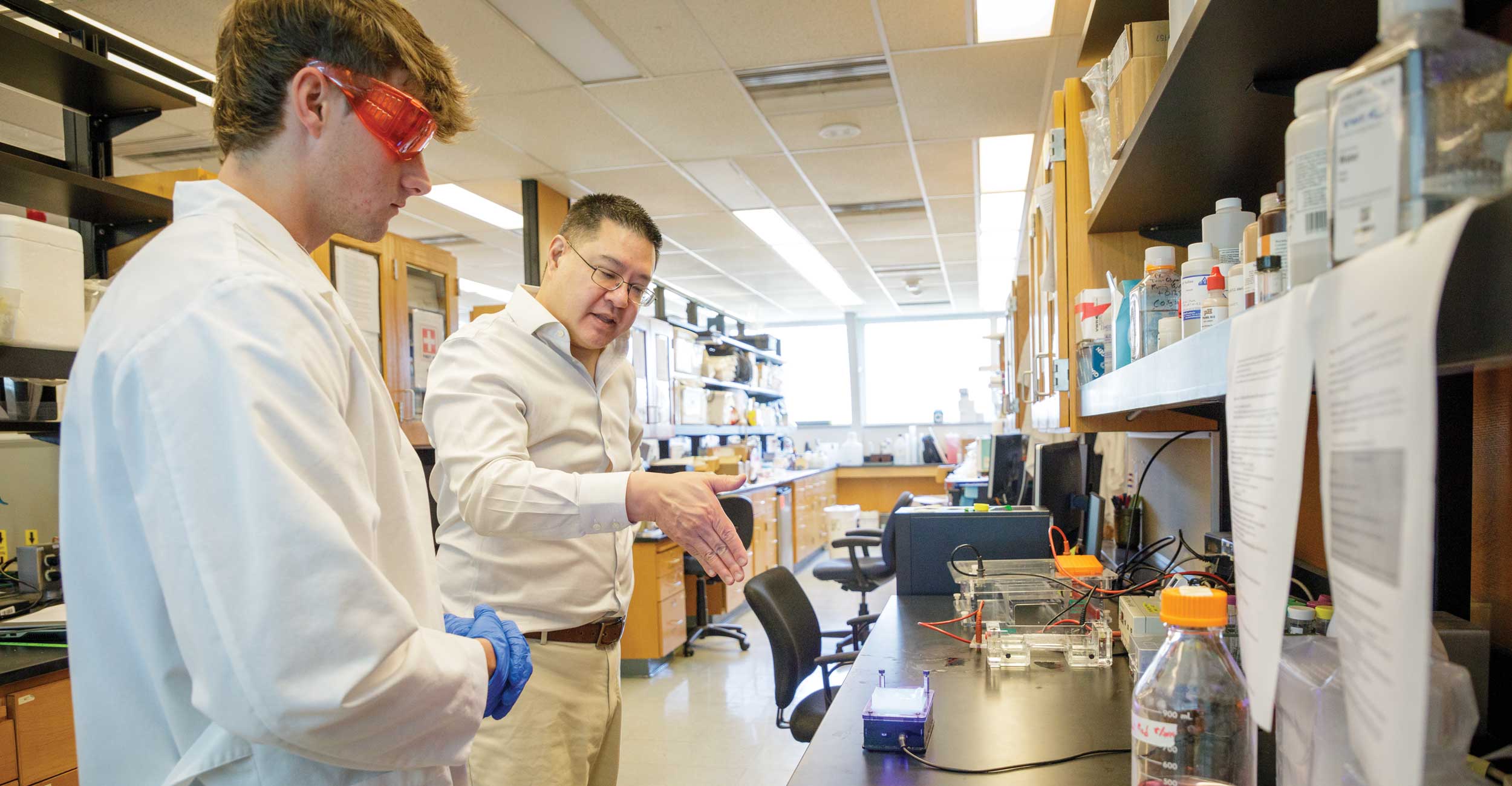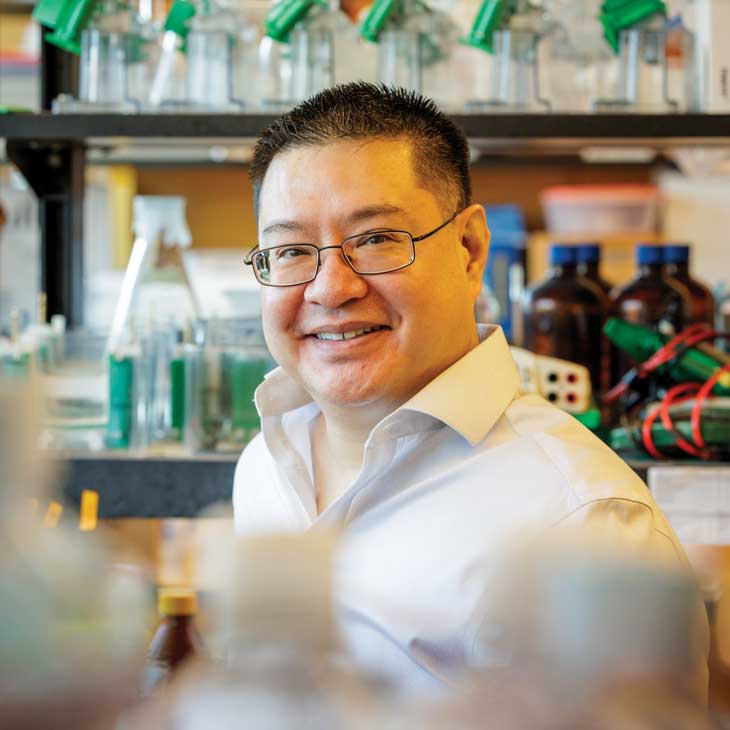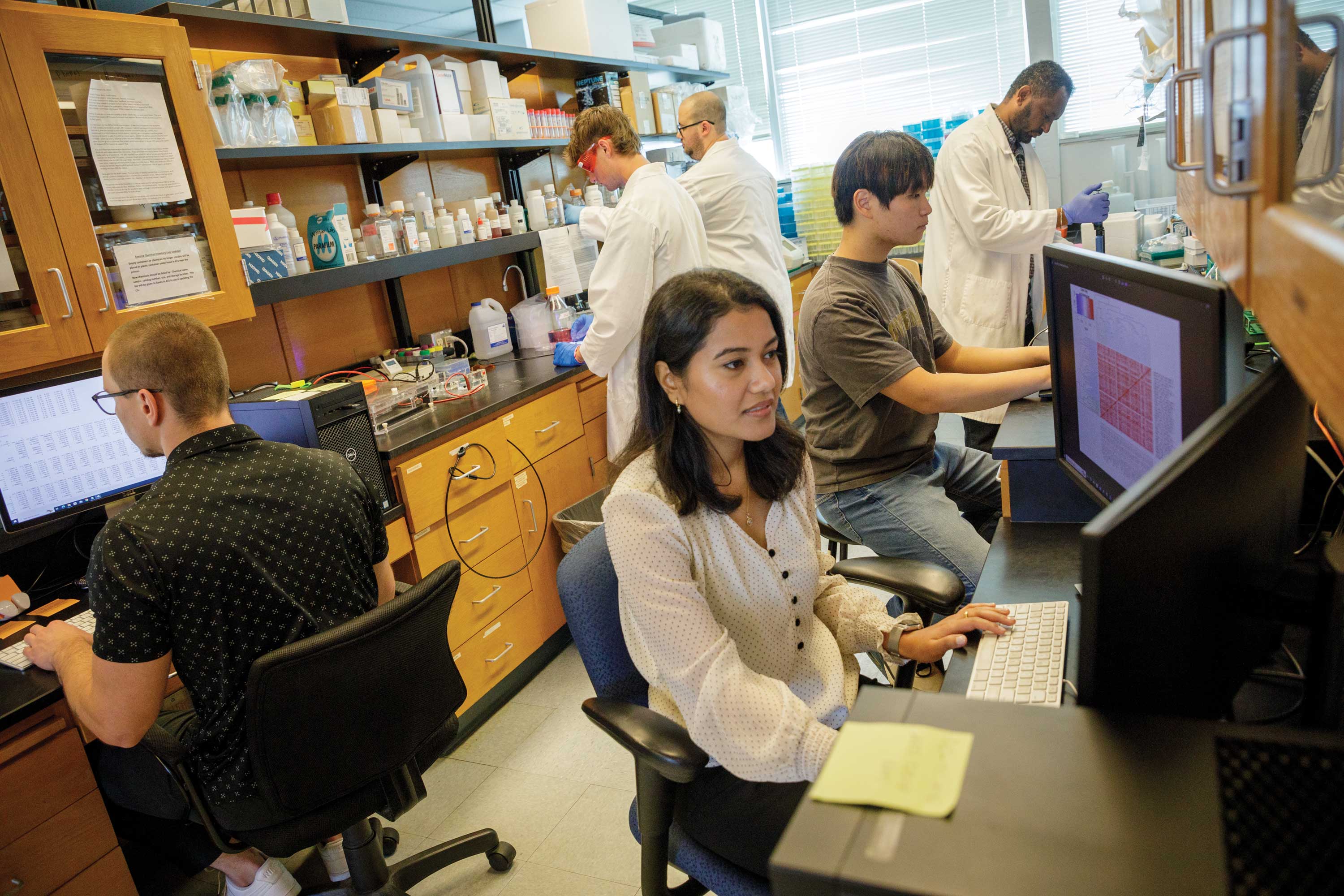
Chowanadisai's expertise praised by colleagues and students alike
Tuesday, October 8, 2024
Media Contact: Sydney Trainor | Communications and Media Relations Specialist | 405-744-9782 | sydney.trainor@okstate.edu
As a Carnegie R1 institution, Oklahoma State University continually attracts the best and brightest to contribute to its land-grant mission, expand research efforts across campus, and mentor students at all levels.
Dr. Winyoo Chowanadisai, associate professor in nutritional sciences, exemplifies this commitment with a passion for research and mentorship that translates to his academic and professional endeavors.

Chowanadisai became interested in the emerging area of neuroscience as an undergraduate double-major at the University of California-Berkeley. Although UC did not have a neuroscience major then, he pursued biology and psychology simultaneously, blending methods, research and theory to advance his knowledge in the field.
Understanding the importance of exposure to the research process, Chowanadisai pursued an undergraduate internship with Dr. Bo Lӧnnerdal at the University of California-Davis, studying human milk proteins vital for infant nutrition and development. This experience was transformative.
“I absolutely enjoyed research, and it was a different experience than being in the classroom,” Chowanadisai said. “In many ways, it was a form of active learning, where I could take things I learned in lectures and apply them to my experiments.”
Mentorship in the lab played a crucial role in Chowanadisai quickly changing his trajectory from clinical practice to research. After additional research stints in behavioral neuroscience and clinical psychology, he continued training with Lӧnnerdal, earning his Ph.D. in nutrition while studying mental transporters and brain development.
With his doctorate, Chowanadisai broadened his expertise, alternating between UC-Davis on the West Coast and the Marine Biological Laboratory at Woods Hole, Massachusetts. This unique arrangement allowed him to blend nutrition and mitochondrial function studies with cell and developmental biology research, creating a multidisciplinary foundation for his future work.
When it came time for his professional career, Chowanadisai was drawn to OSU, partly due to positive recommendations from his mentor, Oklahoma City native Dr. Robert Rucker. The diverse research opportunities also appealed to Chowanadisai’s broad interests.
“The Department of Nutritional Sciences at OSU has a wide breadth of research, from animal and plant experiments to human and community nutrition,” Chowanadisai said. “I knew that I would be fortunate to be able to run my lab here and have all sorts of directions available.”
At OSU, Chowanadisai’s lab is focused on nutrigenomics — the study of how nutrients and genes interact to influence human health.
“We are all different people, and we are shaped by our genetics and also by our environment and what we eat,” Chowanadisai said. “Because of that, I would say that nutrigenomics affects everyone.”
The goal of nutrigenomics research is to expand knowledge about the importance of nutrients in the human diet, potentially allowing people to live longer and healthier lives. The field aims to determine the best diet for individuals based on their unique genetic makeup and how it impacts their food. Such personalized nutrition strategies could revolutionize preventive health care and disease management.
“To refer to Dr. Chowanadisai as anything other than a mentor would be disingenuous. He truly cares for myself and other students as individuals. This results in a holistic guidance that considers students as people, academics and researchers.”
His work landed him recognition as a 2023 President’s Fellows Faculty Research Award recipient, allowing students in his lab to focus on important projects without the extra financial burden.
Chowanadisai’s lab employs a diverse toolkit to tackle complex research questions.
“We use as many tools as we can get our hands on,” he said. “Bioinformatics, data science, cell culture with CRISPR gene editing, PCR and knockout mice models all play crucial roles in our research.”
This multifaceted approach allows the team to investigate various nutrient-gene interactions and their effects on health.
Dr. Norm Hord, head of the Department of Nutritional Sciences, said Chowanadisai’s work is essential to nutrigenomics research.
“Dr. Chowanadisai’s work is pivotal in our quest to understand the nuanced differences in how essential trace minerals such as manganese, zinc, iron and copper are metabolized and signal within the body,” Hord said. “His trailblazing research illuminates the intricate interplay between these nutrients and our genes, shaping brain health through dietary factors.”
Hord said the impact of this research could potentially transform medical approaches used in treating neurological and psychiatric conditions.
Chowanadisai recognizes the importance of pursuing his own research while providing research opportunities for undergraduate students. Similar to his own academic experience, he gladly teaches and mentors students who are excited to get their own gloved hands into nutrition, genetics and science research in the lab.
Chowanadisai’s innovative teaching methods, inspired by another mentor, Dr. Brenda Smith, integrate innovative research into the classroom experience. This approach not only keeps the curriculum current but also introduces students to real-world applications of nutritional science, preparing them for future careers in research or clinical practice.
“My undergraduate course uses research articles as assigned readings instead of textbooks,” Chowanadisai said. “The way I approach teaching is similar to how I think about nutrition research, and my students get a glimpse of that in my classes. The topics covered in my classes often come up in our research discussions and vice versa.”
Parker Johnson, a Ph.D. student and research assistant in Chowanadisai’s lab, attests to the professor’s unique ability to connect concepts.
“Dr. Chowanadisai has a knack for connecting and prompting the application of previously learned concepts,” Johnson said. “Whether you’re a freshman or graduate student, he brings everything full circle, allowing you to incorporate valuable concepts and lines of reasoning.”
Johnson, who focuses on applying bioinformatic approaches and machine learning to large-scale datasets in nutrigenomics, appreciates Chowanadisai’s forward-thinking approach.
“Dr. Chowanadisai has a prospective viewpoint that encourages the accumulation of skills and proficiencies that will propel individuals forward in their career,” Johnson said. “He has helped increase my awareness of the benefits of data science and analytical skills that will equip me for future success in academia.”
Chowanadisai’s expertise and dedication to helping undergraduates get involved in research has led to external funding through multiple prestigious grant awards from the American Heart Association and the National Institutes of Health. The American Heart Association grant supports a collaboration with cardiovascular disease expert and fellow OSU nutritional sciences faculty member Dr. Sam Emerson. It explores how dietary manganese intake may improve cardiovascular health.
“Some people have a genetic polymorphism that results in lower manganese status and probably has an increased risk of cardiovascular disease,” Chowanadisai said. “It is possible that people with this genetic difference could benefit from consuming more foods with manganese.”

The NIH grant focuses on a zinc transporter gene likely crucial for brain development. This study, conducted in collaboration with genetic mouse model experts and OSU nutritional sciences colleagues Drs. Yoo Kim and Dingbo Lin, could provide impactful insights.
“It is possible that people with genetic mutations in this gene may be more likely to have a neurodevelopmental disorder,” Chowanadisai said.
Both grants allow undergraduates to participate in research, giving them vital experience before embarking on their professional journey or further education.
“The ability for undergraduates to participate in research is incredibly meaningful for their futures as they pursue clinical or research-oriented careers after their time in my lab,” Chowanadisai said. “Students will have the opportunity to gain experience in either data science or laboratory research and think about biomedical problems and diseases.”
Hord and Johnson see the direct impact of Chowanadisai’s mentorship efforts across the department.
“It’s encouraging to see Dr. Chowanadisai fostering the next generation of scientists by collaborating with and mentoring undergraduate and graduate students in his laboratory’s discovery research,” Hord said.
“To refer to Dr. Chowanadisai as anything other than a mentor would be disingenuous,” Johnson said. “He truly cares for myself and other students as individuals. This results in a holistic guidance that considers students as people, academics and researchers.”
Chowanadisai stresses that research experience is the most important thing for undergraduates interested in science careers. Getting involved with one of the many faculty and research labs on campus conducting cutting-edge research is his No. 1 suggestion for students starting out.
“The No. 1 takeaway from that experience, like all internships, should be whether they want to do that as a career,” Chowanadisai said. “Experiencing the daily life of a potential profession is important for finding out if it is a good fit for each person. Being able to interact with fellow students and professors closely allows people to ask questions from those folks currently living that life.”
Chowanadisai’s expanding nutrigenomics research at OSU exemplifies the institution’s commitment to innovative science and student mentorship. His collaborative approach is transforming both the field and the career trajectories of OSU graduates.
Johnson has witnessed this impact firsthand.
“Dr. Chowanadisai makes our university and college better through collaboration,” Johnson said. “Despite his extensive merits, he still outsources and collaborates with other researchers, fostering a cooperative environment that will help the College of Education and Human Sciences provide a greater quality of academic products to bring honor and accolade to Oklahoma State University.”
Photos By: Gary Lawson
Story By: Jillian Walker | Research Matters Magazine
